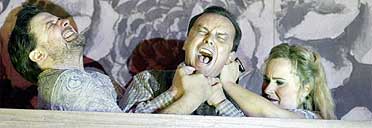
For London audiences, it was English National Opera's 1987 production that really put Shostakovich's Lady Macbeth of Mtsensk on the operatic map.
A quarter of a century earlier Royal Opera had staged Katerina Ismailova, the bowdlerised, politically corrected version of the same work, but only now, in a new staging by Richard Jones, has Lady Macbeth reached Covent Garden in the form that so startled Russian audiences in 1934, and which soon afterwards scandalised Stalin.
The trouble is that this time around it never seems the searing, wonderfully over-the-top score that the ENO production, set in an abbatoir and revived less than three years ago, showed that the work could be.
Jones and his designer, John Macfarlane, translate their version to the 1950s, to a world of shriekingly loud wallpaper, small-screen television and veneered plywood furniture, though whether we are still in the Soviet Union or have been transported to some working-class corner of Britain is not always clear.
Some of the references are certainly Russian and the trek to the Siberian prison camp of the last act is represented by a couple of pantechnicons that disgorge their human cargo for the final drama to be played out.
But Jones never quite gets the balance between grand guignol, black cartoon farce and stark, unblinking human tragedy right. The production fails to twist the emotional knife just when it is needed.
There are some sharp touches - the visible makeover to the set during the big second-act interval as Katerina and her lover, Sergey, transform her family home; the wonderfully comic appearance of the ghost of her father-in-law, Boris, at the couple's wedding - but the emotional centre of the production is hard to locate.
Katerina should attain a tragic grandeur in the last act, but Katarina Dalayman's frowsty view of her is much more mundane. She is too lacking in charm to engage any sympathy in the first two acts, so that the tragic dimension is entirely missing from her death at the final curtain.
But then nobody has a real presence, perhaps because the opera is sung in Russian and not a single member of the cast is a native Russian speaker; most of them are British, and like the production itself characterisation veers from one side of Europe to the other. John Tomlinson's gun-toting father-in-law from hell is predictably compelling; Christopher Ventris's Sergey is forthright enough. Christine Rice is the flirty Sonyetka, Katerina's final victim, but in keeping with the rest of the show she is more Essex girl than Russian criminal.
The rest of the cast certainly have plenty of energy; and Antonio Pappano controls the score and all its excesses efficiently, but it's all surface and there should be more to it than that.

